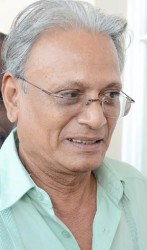Without the legal frameworks to measure and sanction infractions such as bias, access to state media remains problematic, according to APNU+AFC member Dr Rupert Roopnaraine.
Roopnaraine told Stabroek News that while the opposition coalition applauds the Guyana Elections Commission (GECOM) media code of conduct that is intended to ensure the media employs an unbiased framework in election coverage, the follow through by the state media is a moral obligation as opposed to a legal one.
As a result, he said, addressing the real issues with the state-run Guyana Chronicle and the National Communication Network (NCN) remains challenging.

He said the recent Media Monitoring Unit report on adherence to the code during coverage so far was flawed in the sense that there is no follow through on what the unit reports as problematic.
“Unless there were clear penalties for infractions, what are you really doing?” he questioned.
“The problem we face with the state media is the ongoing exclusion of views other than views of the ruling party from the state media,” he added.
He said while GECOM attempts to ensure a system whereby parties would have something like equal access to the media, its efforts do not correct or compensate for “the abominations of the entire period” in which the opposition parties have virtually no access to the state media. He added that the opposition also has to put up with endless disinformation, without a like avenue for response.
NCN has said it reached out to the opposition in relation to a series of debates but the coalition did not respond.
In response, Roopnaraine said he was not aware of why no response was given in a timely fashion but he did note that the coalition has publically indicated its desire to have a prime ministerial debate prior to a presidential debate.
Dr Roopnaraine admitted to “bureaucratic machinery” issues when it came to coordinating the coalition. He noted that the APNU itself was a coalition of five political parties and within the last two weeks the shadow cabinet has been unable to meet, thereby making the dialogue process cumbersome.
He noted that the coalition was learning as it went along and that coordinating and establishing joint structures to ensure that campaign committee throughout the regions operate smoothly has been a difficult task.
In February, the opposition noted that it would be strengthening its lobby to ensure that it is given equitable access and coverage in the state media during the campaign leading up to the May 11th general elections but there has been no significant change in the opposition’s behaviour.
Alliance For Change (AFC) Executive Member Cathy Hughes previously told Stabroek News that state media bias may also need to be tackled from a legal standpoint.
She cited the Guyana Constitution and the United Nations Charter as being inclusive of the freedom to receive and disseminate information to support inclusive democracy. “We maintain that we should be able to come to the table, put our money on the table and we should be permitted to utilise a national resource,” Hughes had said.




